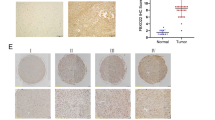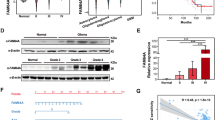Abstract
The human leukocyte antigen f-associated transcript 10 (FAT10) has a similar structure and function with ubiquitin, which efficiently mediate proteasome degradation in an ubiquitin-independent manner. FAT10 expression is upregulated in many tumor tissues and plays a vital role in cell cycle regulation and tumor genesis. However, its role in glioma has not been illuminated. The aim of this study was to evaluate the prognostic value of FAT10 and investigate its functional roles in glioma. The expression of FAT10 in glioma patient samples was examined using quantitative real-time reverse-transcriptase polymerase chain reaction (qRT-PCR), Western blotting and immunohistochemistry methods. Glioma cell lines with either FAT10 overexpression or knockdown were created. The effect of FAT10 on glioma cell migration and invasion was investigated using these cells. In the present study, we had shown that FAT10 was elevated significantly in glioma samples and correlated with tumor pathological grade. FAT10 high-expression glioma is associated with a poor clinical prognosis. Overexpression of FAT10 promoted proliferation, invasion, migration, and sphere formation of glioma cells, whereas downregulation of FAT10 had an opposite effect. Overexpression of FAT10 also promoted the growth of glioma cells in vivo. Moreover, FAT10 enhanced the phosphorylation of Smad2, which contributes to FAT10-induced oncogenic activities in glioma. In conclusion, these findings indicate that FAT10 is a critical regulator potential therapeutic target of glioma.










Similar content being viewed by others
References
Butowski NA, Sneed PK, Chang SM. Diagnosis and treatment of recurrent high-grade astrocytoma. J Clin Oncol. 2006;24(8):1273–80.
Kaminska B, Kocyk M, Kijewska M. TGF beta signaling and its role in glioma pathogenesis. Adv Exp Med Biol. 2013;986:171–87.
Swiatek-Machado K, Kaminska B. STAT signaling in glioma cells. Adv Exp Med Biol. 2013;986:189–208.
Gong A, Huang S. FoxM1 and Wnt/beta-catenin signaling in glioma stem cells. Cancer Res. 2012;72(22):5658–62.
Zhang X, Chen T, Zhang J, Mao Q, Li S, Xiong W, et al. Notch1 promotes glioma cell migration and invasion by stimulating beta-catenin and NF-kappaB signaling via AKT activation. Cancer Sci. 2012;103(2):181–90.
Isaacson MK, Ploegh HL. Ubiquitination, ubiquitin-like modifiers, and deubiquitination in viral infection. Cell Host Microbe. 2009;5(6):559–70.
Hipp MS, Kalveram B, Raasi S, Groettrup M, Schmidtke G. FAT10, a ubiquitin-independent signal for proteasomal degradation. Mol Cell Biol. 2005;25(9):3483–91.
Buchsbaum S, Bercovich B, Ciechanover A. FAT10 is a proteasomal degradation signal that is itself regulated by ubiquitination. Mol Biol Cell. 2012;23(1):225–32.
Ren J, Kan A, Leong SH, Ooi LL, Jeang KT, Chong SS, et al. FAT10 plays a role in the regulation of chromosomal stability. J Biol Chem. 2006;281(16):11413–21.
Li T, Santockyte R, Yu S, Shen RF, Tekle E, Lee CG, et al. FAT10 modifies p53 and upregulates its transcriptional activity. Arch Biochem Biophys. 2011;509(2):164–9.
Ji F, Jin X, Jiao CH, Xu QW, Wang ZW, Chen YL. FAT10 level in human gastric cancer and its relation with mutant p53 level, lymph node metastasis and TNM staging. World J Gastroenterol. 2009;15(18):2228–33.
Yuan J, Tu Y, Mao X, He S, Wang L, Fu G, et al. Increased expression of FAT10 is correlated with progression and prognosis of human glioma. Pathol Oncol Res. 2012;18(4):833–9.
Liu L, Dong Z, Liang J, Cao C, Sun J, Ding Y, et al. As an independent prognostic factor, FAT10 promotes hepatitis B virus-related hepatocellular carcinoma progression via Akt/GSK3beta pathway. Oncogene. 2014;33(7):909–20.
Wang Y, Wen M, Kwon Y, Xu Y, Liu Y, Zhang P, et al. CUL4A induces epithelial-mesenchymal transition and promotes cancer metastasis by regulating ZEB1 expression. Cancer Res. 2014;74(2):520–31.
Sun Y, Wang Y, Fan C, Gao P, Wang X, Wei G, et al. Estrogen promotes stemness and invasiveness of ER-positive breast cancer cells through Gli1 activation. Mol Cancer. 2014;13:137.
Theng SS, Wang W, Mah WC, Chan C, Zhuo J, Gao Y, et al. Disruption of FAT10-MAD2 binding inhibits tumor progression. Proc Natl Acad Sci U S A. 2014;111(49):E5282–91.
Yuan R, Wang K, Hu J, Yan C, Li M, Yu X, et al. Ubiquitin-like protein FAT10 promotes the invasion and metastasis of hepatocellular carcinoma by modifying beta-catenin degradation. Cancer Res. 2014;74(18):5287–300.
Lukasiak S, Schiller C, Oehlschlaeger P, Schmidtke G, Krause P, Legler DF, et al. Proinflammatory cytokines cause FAT10 upregulation in cancers of liver and colon. Oncogene. 2008;27(46):6068–74.
Canaan A, DeFuria J, Perelman E, Schultz V, Seay M, Tuck D, et al. Extended lifespan and reduced adiposity in mice lacking the FAT10 gene. Proc Natl Acad Sci U S A. 2014;111(14):5313–8.
Liang X, Zeng J, Wang L, Shen L, Ma X, Li S, et al. Histone demethylase RBP2 promotes malignant progression of gastric cancer through TGF-beta1-(p-Smad3)-RBP2-E-cadherin-Smad3 feedback circuit. Oncotarget. 2015;6(19):17661–74.
Jennings MT, Pietenpol JA. The role of transforming growth factor beta in glioma progression. J Neurooncol. 1998;36(2):123–40.
Acknowledgments
This work was supported by the National Key Technology Research and Development Program of the Ministry of Science and Technology of China (2013BAI09B03).
Author information
Authors and Affiliations
Corresponding author
Ethics declarations
All patients gave informed consent for the analyses to be undertaken, and the study protocol was approved by the Ethical Committee of the coordinating center, the Capital Medical University (Decision no. CMU-201409). Animal handling and research protocols were approved by the Animal Care and Use Ethnic Committee of Capital Medical University, Beijing China (Decision no. CMU-201410).
Conflicts of interest
None
Electronic supplementary material
Below is the link to the electronic supplementary material.
Supplemental Table 1
(DOCX 15 kb)
Supplemental Table 2
(DOCX 18 kb)
Rights and permissions
About this article
Cite this article
Dai, B., Zhang, Y., Zhang, P. et al. Upregulation of p-Smad2 contributes to FAT10-induced oncogenic activities in glioma. Tumor Biol. 37, 8621–8631 (2016). https://doi.org/10.1007/s13277-015-4739-6
Received:
Accepted:
Published:
Issue Date:
DOI: https://doi.org/10.1007/s13277-015-4739-6




